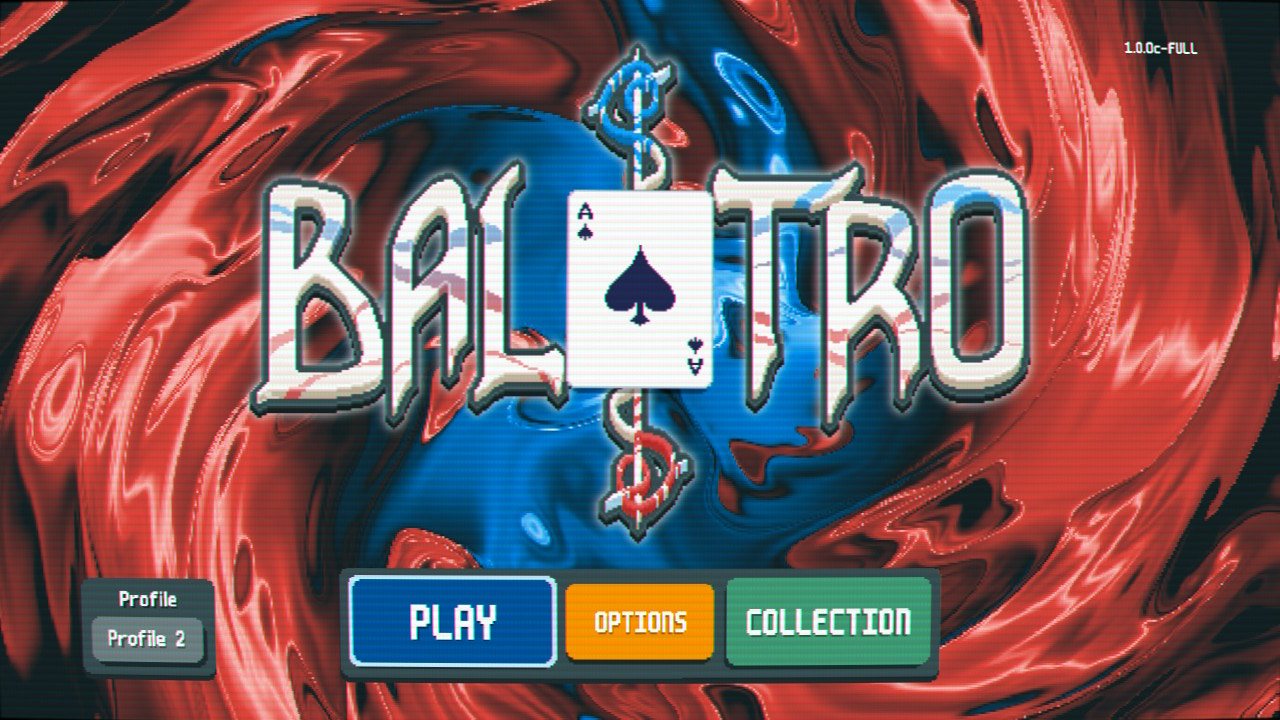I told myself last week that I wasn't going to buy Balatro. I had acquired a Nintendo Switch over Christmas (did you know that a Switch is actually $300 and not $1000, and please do not ask how I went six years believing that second part) and it did terrible things to my video game purchases, like enabling a suite of games, Balatro included, that I otherwise would not be able to play as a certified MacBook Air gamer. But I was not going to buy Balatro while I was in the middle of three other games. I was going to wait for more reviews to roll in or a sale or even a MacOS release, and then I would consider it.
In Balatro, you start with a standard deck of 52 playing cards. Your goal each round (or blind) is to score a certain number of points within a limited number of played hands and discards. There are eight antes, and each ante has three blinds (the small blind, large blind, and boss blind: your classic poker line-up). The points goal increases each subsequent round while your hands and discards stay stagnant—but beat a blind, and you earn a bit of cash and access to a store full of cards that can modify your deck; skip a blind, and you forsake immediate improvement for future benefits.
An incomplete list of possible cards you can get in Balatro: planet cards that increase the base points value of poker hands; tarot cards that can add, delete, duplicate, change the suits of, and otherwise improve cards; vouchers that can improve your economy or increase your hands and discards per round; and a suite of 150 joker cards that do basically anything, from providing extra cash to allowing you to make flushes and straights with only four cards. You can play some totally real poker hands like five-of-a-kind and a flush house. A joker card named Jimbo walks you through the tutorial and then mocks you if you fail. It's a brilliant, well-crafted game, and has clever art and a banging soundtrack to boot.
Anyway, I lasted approximately half a day because I am a sucker for roguelike games—Hades, Slay the Spire, Inscryption, even the Simulated Universe portion of Honkai: Star Rail, may all gacha gamers eventually find peace—and Balatro was a poker roguelike deckbuilder, which is a specific combination of words that will cause a specific population of gamers to start frothing at the mouth. I bought the game and played until midnight. Baseball spring training started, so I put on the first televised Phillies game and played Balatro. Over the weekend, a friend called to ask me if I wanted to get bubble tea and then malatang, and I nearly turned them down because I was playing Balatro. The Switch currently prioritizes telling me that I got Balatro seven days ago, rather than my hours played—this is a good thing, because it means that I don't have to face my true self for at least a little while longer.
After all this time, would I describe myself as being "good" at "the game?" No. I get tunnel vision and try to force a flush build almost every single run. Sometimes I'm too lazy to check the cards remaining in the deck so I try to discard for a full house that doesn't exist. I overconfidently skip blinds even if it basically makes it impossible for me to beat the boss blind. The Balatro stats page reveals some respectable things, like how my highest ante in endless mode is 12, and some less respectable things, like how my best win streak is 2, and some unsurprising things, like how my most played hand is flushes. I've hit a hand worth 45 million points before, and then I immediately fumbled with the controls and sold a still-scaling joker card that was giving me a 3x buff to my score. I will never have the mental overhead required to enter the scientific notation zone of single-hand scoring.
This would be unfun in most genres of video game, but roguelikes are built to reward failure. After all, there is no real end—once you beat the eighth ante on a deck of cards, a harder mode unlocks for that deck. If you beat the hardest mode available, there are still other decks to complete. If you beat that, then there's always endless mode. It's perhaps unsurprising that I enjoy iterative processes, but this Samuel Beckett–ass genre of video game explains why and how I have 216.9 hours in Slay the Spire while, again, not being very good. I'm loath to search up the most powerful deck build, not because I want to discover it on my own (again with the mental overhead: I doubt I'll ever be able to) but because that would suck a lot of the joy out of my experience. Throwing bananas at the wall and seeing what sticks is rewarding. It has to be, because you'll fail a lot—the only hope is that the next time, you'll fail better. I want to win, but more than that, I want to play, and with 150 jokers in the game, there are infinite ways to play. Now, if you'll excuse me, I'm going to go boot up the game and play another flush deck.






